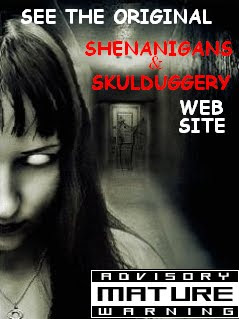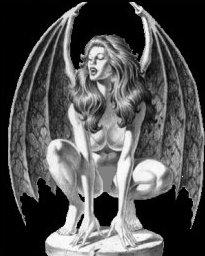Haunted West-End Theatres
London’s theatreland is steeped in superstition and tales of ghostly goings on, from the spectral presence of the clown Grimaldi stalking the corridors of the Theatre Royal Drury Lane to the gay ghost at the Queen’s Theatre and the dolphins said to haunt the Peacock Theatre (having died, since you ask, of neglect after being installed as props for one of Paul Raymond’s girlie shows). In this context, it’s perhaps not surprising that not one but two stage managers working at the same theatre should be practising mediums in their spare time. Having discovered this common interest in 2005, when their paths crossed at the Dominion Theatre (allegedly haunted by a ghostly brewery worker, a giggling child, at least one poltergeist and quite possibly the tormented soul of Freddie Mercury, appalled at the horrors of ‘We Will Rock You’), Becky Walsh and Ian John Shillito decided to get together, Scooby Gang-style, and investigate all these theatrical ghost stories for themselves. Unlike most similar projects, they could use their professional contacts to gain access to the hidden workings of each theatre, and the resulting book is as much a treasure trove of backstage secrets and historical nuggets as a serious attempt to separate the genuine hauntings from tradition or (let’s face it) PR. ‘One of the most important things to do is to eliminate any natural causes before we look at the supernatural,’ says Shillito. ‘I do believe in life after death, but the more I work in this field the more I realise that a lot of other things can cause these phenomena. But we tried to leave the final decision up to the reader. The results of their investigations may give nervous theatre-goers pause for thought. Did you know, for instance, that the Lyceum contains an ‘energy vortex’ which may function as a porthole for spirits to ‘pop in and out of dimensions’? Or that the ‘Buckingham Palace ley line’ runs underneath the Victoria Apollo, and may have been turned into a negative ‘black stream’ by tragic events like the Blitz? Or that the electrical supply room of the Trafalgar Studios is home to a Gollum-like presence – gaunt, naked and skinny – which feeds off the electricity and causes power cuts? On the other hand, many popular ghost stories can be discounted if Shillito and Walsh are to be believed. They draw a firm distinction between proper ‘three-dimensional’ ghosts and other manifestations which they call ‘energy playback’ (where the fabric of the building soaks up events and emotions and then plays them back at a later date) and ‘thought form manifestations’ (created by the repetition of thoughts and emotions associated with a particular location. In some cases their conclusions are even more radical. ‘One of the things we’ve discovered – and this is a fairly recent conversation in the paranormal world – is the effect of infrasound on our own physical and spiritual bodies,’ says Shillito. ‘The majority of the theatres have problems with drainage and flooding, because a lot of them are built on the old underground London rivers and sewers.’ At both the Aldwych and the Dominion there are streams visible beneath the substage area, causing frequent floods as well as possibly creating spooky infrasound vibrations. The most genuinely haunted theatre in London is not the Theatre Royal Drury Lane, as most people believe, but the Theatre Royal Haymarket. ‘So many different people have seen exactly the same spirit,’ says Walsh, ‘and when they’re shown a picture of the gentleman in question, who’s called John Buckstone, all of them recognise him and say: “Yeah, that’s the man I saw”. These are people like Judi Dench and Donald Sinden, as well as the master carpenter and the chief electrician.’ Buckstone was the actor-manager of the theatre from 1853 to 1879, and apparently still likes to take an interest in the place, popping up in dressing rooms (particularly his own, Dressing Room 1), stairwells, the royal box and once even on stage during a performance. So what is it about theatres that attracts ghosts? For Shillito, it’s something to do with the atmosphere of the buildings. ‘It’s really amazing going into a theatre when there’s no one there,’ he says. ‘It’s a bit like walking around a child’s playground at night, it’s quite frightening. Theatre is about storytelling and understanding the human condition through stories. That’s why the people who are attracted to work in the theatre love stories, and why these ghost stories have lasted so long. If you think about it, half the shows on in the West End are about ghosts.'
In some cases their conclusions are even more radical. ‘One of the things we’ve discovered – and this is a fairly recent conversation in the paranormal world – is the effect of infrasound on our own physical and spiritual bodies,’ says Shillito. ‘The majority of the theatres have problems with drainage and flooding, because a lot of them are built on the old underground London rivers and sewers.’ At both the Aldwych and the Dominion there are streams visible beneath the substage area, causing frequent floods as well as possibly creating spooky infrasound vibrations. The most genuinely haunted theatre in London is not the Theatre Royal Drury Lane, as most people believe, but the Theatre Royal Haymarket. ‘So many different people have seen exactly the same spirit,’ says Walsh, ‘and when they’re shown a picture of the gentleman in question, who’s called John Buckstone, all of them recognise him and say: “Yeah, that’s the man I saw”. These are people like Judi Dench and Donald Sinden, as well as the master carpenter and the chief electrician.’ Buckstone was the actor-manager of the theatre from 1853 to 1879, and apparently still likes to take an interest in the place, popping up in dressing rooms (particularly his own, Dressing Room 1), stairwells, the royal box and once even on stage during a performance. So what is it about theatres that attracts ghosts? For Shillito, it’s something to do with the atmosphere of the buildings. ‘It’s really amazing going into a theatre when there’s no one there,’ he says. ‘It’s a bit like walking around a child’s playground at night, it’s quite frightening. Theatre is about storytelling and understanding the human condition through stories. That’s why the people who are attracted to work in the theatre love stories, and why these ghost stories have lasted so long. If you think about it, half the shows on in the West End are about ghosts.'
 In some cases their conclusions are even more radical. ‘One of the things we’ve discovered – and this is a fairly recent conversation in the paranormal world – is the effect of infrasound on our own physical and spiritual bodies,’ says Shillito. ‘The majority of the theatres have problems with drainage and flooding, because a lot of them are built on the old underground London rivers and sewers.’ At both the Aldwych and the Dominion there are streams visible beneath the substage area, causing frequent floods as well as possibly creating spooky infrasound vibrations. The most genuinely haunted theatre in London is not the Theatre Royal Drury Lane, as most people believe, but the Theatre Royal Haymarket. ‘So many different people have seen exactly the same spirit,’ says Walsh, ‘and when they’re shown a picture of the gentleman in question, who’s called John Buckstone, all of them recognise him and say: “Yeah, that’s the man I saw”. These are people like Judi Dench and Donald Sinden, as well as the master carpenter and the chief electrician.’ Buckstone was the actor-manager of the theatre from 1853 to 1879, and apparently still likes to take an interest in the place, popping up in dressing rooms (particularly his own, Dressing Room 1), stairwells, the royal box and once even on stage during a performance. So what is it about theatres that attracts ghosts? For Shillito, it’s something to do with the atmosphere of the buildings. ‘It’s really amazing going into a theatre when there’s no one there,’ he says. ‘It’s a bit like walking around a child’s playground at night, it’s quite frightening. Theatre is about storytelling and understanding the human condition through stories. That’s why the people who are attracted to work in the theatre love stories, and why these ghost stories have lasted so long. If you think about it, half the shows on in the West End are about ghosts.'
In some cases their conclusions are even more radical. ‘One of the things we’ve discovered – and this is a fairly recent conversation in the paranormal world – is the effect of infrasound on our own physical and spiritual bodies,’ says Shillito. ‘The majority of the theatres have problems with drainage and flooding, because a lot of them are built on the old underground London rivers and sewers.’ At both the Aldwych and the Dominion there are streams visible beneath the substage area, causing frequent floods as well as possibly creating spooky infrasound vibrations. The most genuinely haunted theatre in London is not the Theatre Royal Drury Lane, as most people believe, but the Theatre Royal Haymarket. ‘So many different people have seen exactly the same spirit,’ says Walsh, ‘and when they’re shown a picture of the gentleman in question, who’s called John Buckstone, all of them recognise him and say: “Yeah, that’s the man I saw”. These are people like Judi Dench and Donald Sinden, as well as the master carpenter and the chief electrician.’ Buckstone was the actor-manager of the theatre from 1853 to 1879, and apparently still likes to take an interest in the place, popping up in dressing rooms (particularly his own, Dressing Room 1), stairwells, the royal box and once even on stage during a performance. So what is it about theatres that attracts ghosts? For Shillito, it’s something to do with the atmosphere of the buildings. ‘It’s really amazing going into a theatre when there’s no one there,’ he says. ‘It’s a bit like walking around a child’s playground at night, it’s quite frightening. Theatre is about storytelling and understanding the human condition through stories. That’s why the people who are attracted to work in the theatre love stories, and why these ghost stories have lasted so long. If you think about it, half the shows on in the West End are about ghosts.'
















